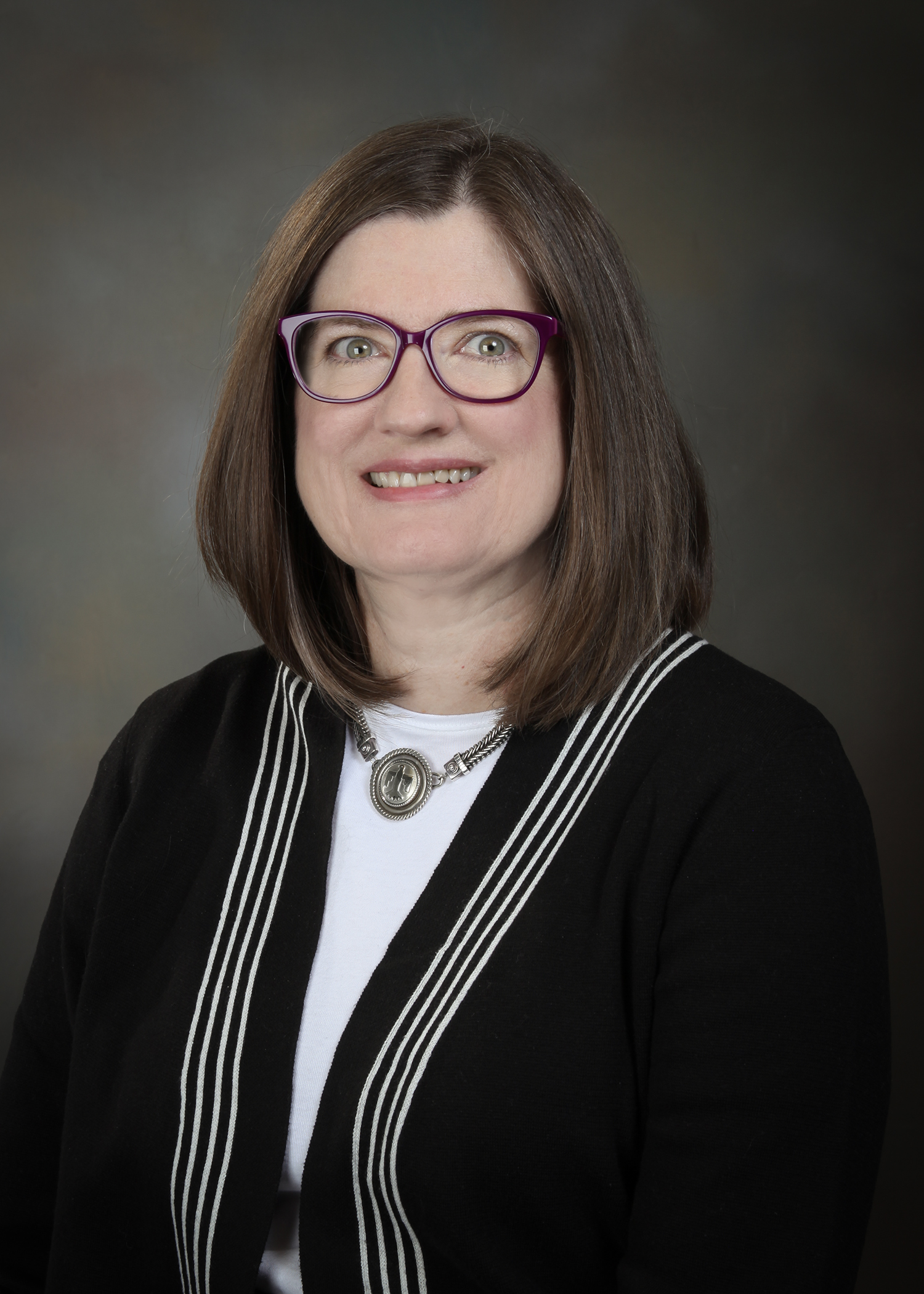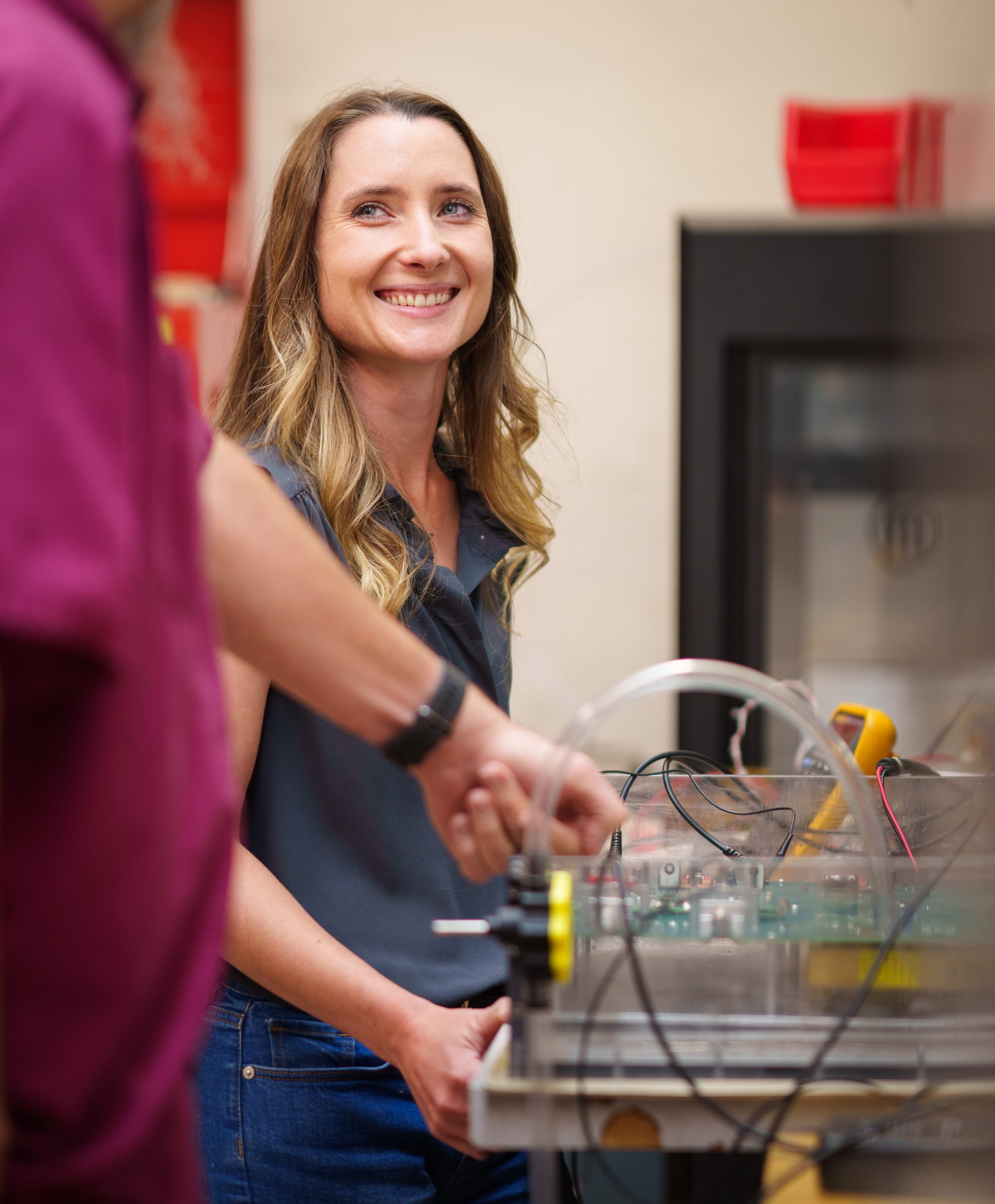ALBUQUERQUE, N.M. — Women engineers at Sandia National Laboratories achieved significant recognition in 2023 from the Society of Women Engineers. These accolades included Advocating Women in Engineering, Distinguished New Engineer and 10 patent recognition awards.
SWE’s awards program celebrates high levels of achievement among individuals who identify as women and allies in engineering, engineering technology or science related to engineering at all career stages.
Leslie Phinney — Advocating Women in Engineering
Phinney is the manager of Sandia’s Thermal Sciences and Engineering department, where she’s worked since August 2015.
“I arrived at Sandia in 2003 as an experimentalist qualitatively examining laser interactions and the heating of polycrystalline silicon microdevices,” she said. “Over the years, that work progressed into developing modeling and computations for improved diagnostic techniques to quantify the temperatures of the materials. Now I’m a manager.”

Phinney grew up in a family of generations of teachers.
“My parents both have master’s degrees,” she said. “My great-grandfather was a teacher in Indiana and really believed in education for women, which at the time wasn’t common. I also had a great aunt who graduated in the late 1920s with a university degree in math, which was pretty unusual at the time. It took her 10 years to get a job teaching due to the Great Depression and only after men began enlisting for service in World War II.”
Math quickly became Phinney’s passion in school but astronaut Sally Ride, the first American woman to fly in space, was her inspiration. She locked into aerospace engineering as her college major at the University of Texas, where she enjoyed fluid mechanics and heat transfer courses.
“That directed me more towards mechanical engineering,” she said. Phinney went on to earn her master’s and doctoral degrees in mechanical engineering.
As she delved deeper into her engineering pursuits, Phinney noticed the ranks of women dwindling.
“While earning my degrees, there were fewer women as I went along,” she said. “I knew I was a minority, but I didn’t feel like a minority because I was supported.”
After receiving her doctorate in mechanical engineering at the University of California, Berkeley in 1997, Phinney joined the mechanical and industrial engineering department at a renowned Midwest university as a junior faculty member.
“I was the first woman mechanical engineering professor hired at the university and one of two women in a department of 50,” Phinney said. “It was a bit of an isolating experience.”
Six years later, Phinney moved from academia to Sandia in 2003 as a technical staff member and is now a department manager, a position she has held since September 2020.
Phinney’s life experiences — support from her family, fellow students, colleagues and friends — have compelled her to improve the engineering journey for those who follow.
“My true desire at this point in my career is to make things better for those who are coming after me,” she said. “I see engineering as a good career choice for everyone, and I don’t want anyone to be excluded from the opportunities that are available.”
And she’s been busy over the years encouraging young people, especially young women, to pursue engineering by establishing scholarships for women in engineering and mentoring engineering students through numerous professional and technical societies. Phinney provides leadership and activities for the Sandia Women’s Action Network, the American Society of Mechanical Engineers and the Society of Women Engineers. She also engages in local education outreach activities that expand the concepts and appeal of engineering.
“I’ve often heard the phrase, ‘You can’t be what you can’t see,’ so over the years I’ve tried to empower women engineers to be visible and involved in their communities,” Phinney said. Part of her core mission is her belief in the potency of diversity. “Having people from different fields of study, life experiences, cultures and beliefs boosts creativity and innovation, versus a more homogeneous team that is likely to fall into groupthink. Engineers are in the business of solving difficult problems, and we need the best people and most innovative teams to solve them.”
About the award, Phinney said: “I see this award as meaningful recognition that I’m trying to make an impact. I think there’s still more work to be done.”
When asked for advice for aspiring women engineers, Phinney said: “Be persistent. Engineering takes a long, sustained academic and professional effort. If you’re looking for an easy college major or career, take engineering off your list.”
Emily Schrock — Distinguished New Engineer
Schrock is an electrical engineer conducting experimental lab work with various pulse-power systems. She performs modeling designs and diagnostics for both the systems and their components.
Schrock’s interest in engineering sparked at an early age visiting job sites with her dad, who is an electrical engineer in Texas where she grew up.
“My dad always had a big hand in the electrical work as a project manager for the design and construction of buildings,” Schrock said. “We would walk through the sites and talk about electrical and mechanical designs and functions. Getting to see the actual application of electrical engineering growing up really got me interested.”
As a teenager, Schrock’s interest and aptitude in math and science cleared a path toward physics where she was drawn to the electrical and magnetism disciplines.
“When it came time to declare a major in college, I chose electrical engineering and I absolutely loved it,” she said. “I had a great group of friends, and we took the same classes together. That support group helped but it wasn’t easy. I remember a good number of all-nighters.”
Schrock earned her master’s degree in electrical engineering from Texas Tech University in 2017, the same year her then fiancée was stationed at Kirtland Air Force Base in Albuquerque. Through a Tech alumnus, she learned of an opening at Sandia for an electrical engineer with pulse-power experience and a semiconductor background — work she had performed in college. She hired on at the Labs in 2017 as a research and development science and engineering microwave and sensor engineer.
“I’ve been able to do some very cool things here at Sandia,” Schrock said. “What I really like is building and then field-testing system hardware. Over the years, I’ve enjoyed being able to test our design work and experience its success in the field.”
About the award, Schrock said: “It’s really special because I was up against such a variety of people from major technology companies doing great things in their fields with backgrounds so different from mine.”
When asked for advice for aspiring women engineers, Schrock said: “If you want to be an engineer or physicist, don’t let anything stand in your way. If you start feeling you don’t belong, take advantage of the outreach available to you and find a mentor who will cheer you on. Don’t allow others to choose your career path when you could make a big difference in an engineering realm.”
SWE Patent Recognition Awards
The following engineers received the SWE Patent Recognition Awards:
Laura Biedermann, principal member of the technical staff, research and development physicist. System and Method for Cooling Using a Heat Exchanger Having a Membrane and Filtration Membranes.
Suma Cardwell, principal member of the technical staff, research scientist. Spiking Retina Microscope.
Gabriella Dalton, principal member of the technical staff, research and development optical engineer. Calibration Method for a Spectral Computerized Tomography System.
Katharine Harrison, former Sandia employee, research and development materials scientist. Nanoporous Carbon as an Anode Material for Li-ion Batteries; and Nanoporous Carbon as a Host for Sodium.
Nadine Miner, manager, University of Texas Austin Campus Partnership; computer science researcher. Methods, Systems and Computer Program Products for Determining Systems Re-Tasking.
Stacy Nelson, manager, research and development, science and engineering. Enhanced Composites Via Selective Interfacial Modification.
Karla Reyes, research and development manager materials chemistry. Apparatus, Methods and System for Temperature Gradient Aging with In-Situ Electrical Monitoring; and Thermal Measurement Apparatus and Methods for Anisotropic Thermal Materials.
Dorina Sava Gallis, principal member of the technical staff, research and development materials scientist. Degradation of Chemical Agents Using Metal-Organic Frameworks Compositions; Tunable Metal-Organic Framework Compositions and Methods Thereof; and Compositions, Systems and Methods for Selective Porous Material Oxygen Separation.
Heidi Smartt, distinguished member of technical staff, research and development electrical engineering. Non-Contact Rapid Reader System for Reflective Particle Tags and two for Fluorescent Compositions.
Erika Vreeland, manager, research and development. Micro-lensed Fiber Optic Plate; and Magnetic Needle Separation and Optical Monitoring.
The Society of Women Engineers, founded in 1950, is a not-for-profit educational and service organization that empowers women to achieve their full potential in careers as engineers and leaders.
